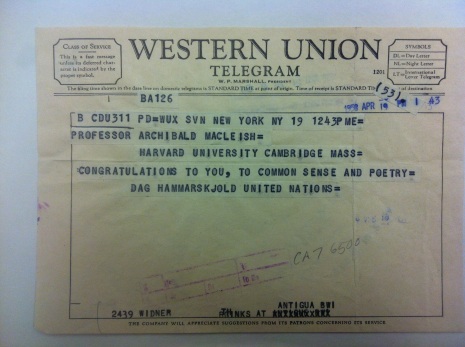Is there something poetic about the United Nations? Dag Hammarskjöld, the second secretary general of the UN, apparently felt so. Beginning in the mid-1950s, Hammarskjöld strove energetically to help free Ezra Pound from St. Elizabeths Hospital. The poet had been committed since 1945 when his lawyers claimed insanity on his behalf, effectively guarding him against persecution for treason. Though for the most part Hammarskjöld kept his efforts on Pound’s behalf hidden from public view, he regularly assisted Archibald MacLeish in garnering support for the release of Pound. Hammarskjöld felt that poetry, like the UN, operated in a space above or beyond national interests. Apparently this also applied to anti-Semitic poets who showed little contrition for their support for Hitler and European fascism. In 1958, when Pound’s release was secured and the poet sailed back to Italy (throwing up fascist salutes as he departed), Hammarskjöld sent this telegram to MacLeish, celebrating a victory for poetry.
- Comment
- Reblog
-
Subscribe
Subscribed
Already have a WordPress.com account? Log in now.

I think that Hammarskjöld’s efforts are wrongheaded at best. He argues that it is a “victory for poetry”, but I would suggest that this action actually serves to undermine poetry. Pound spent many years using his power to manipulate words, the same ability he used to write poetry, to advocate for fascism and anti-semitism. Campaigning for Pound’s release actually undermines his poetry. If Pound’s poetry influenced individuals, society, and culture, then so did his radio broadcasts and letters to politicians campaigning on behalf of fascism. By advocating for his release, Hammarskjöld attempts to deny the latter, but actually ends up diminishing both. Poetry might be able to “operate in a space above or beyond national interests”, but World War II was not a skirmish over a disputed border. Invoking transnationalism to further this cause was wrong.
However, in terms of the notion that poetry being able to “operate in a space above or beyond national interests”, I think that it actually can be appropriate for the UN to advocate these sorts of ideas. In many ways it is useful for the UN to try and have a transnational perspective, as it means that deal with issues in a manner that transcends the idea of a nation.
LikeLike